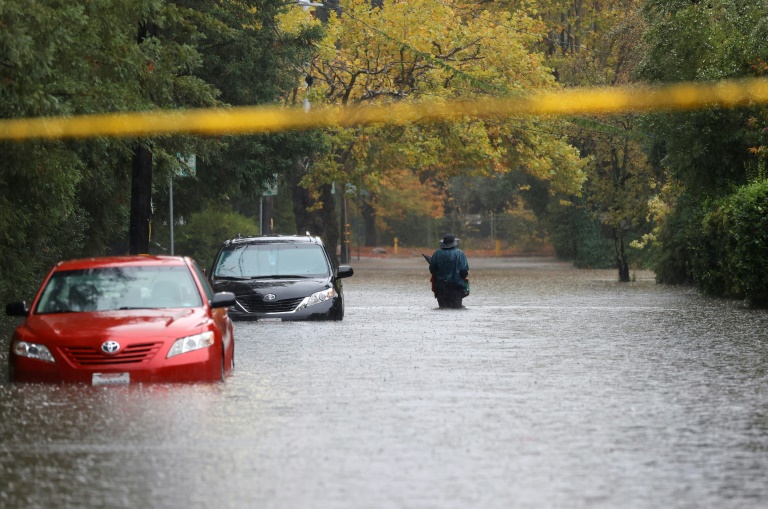A “bomb cyclone” brought floods and landslides to drought-hit California as forest fire-scarred landscapes were unable to soak up record-breaking rains.
Severe thunderstorms deluged the northern part of the state, with strong winds pummeling the area, toppling powerlines and trees and leaving at least two people dead.
The cyclone roared in from the Pacific Ocean and struck San Francisco and Oakland, as well as the states of Oregon and Washington, further north, on Sunday.
It also lashed British Columbia, Canada’s western-most province, leaving thousands without power.
Two people were killed when a tree fell on their vehicle near Seattle.
California’s state capital, Sacramento, which saw no rain at all in the six months to September, was deluged with 14 centimeters (five and a half inches), beating a record that had stood since 1880.
The rains inundated towns, leaving some streets waist-deep in water, photographs showed.
In Ross, a small city in the northern part of the state, rescue crews were scrambling to remove trees blown down by the winds.
In nearby San Rafael, streets were completely flooded, with water rising above the height of vehicle tires, while further south in Marin City, crews were working to redirect water into drains.
Since the storms began Sunday night, nearly 400,000 people have been left without power because of the high winds, utility PG&E said.
– Global warming increases extreme weather –
Meteorologists say the desiccated landscape of the US west finds it difficult to absorb heavy rains, and water just washes destructively off the surface.
That problem is exacerbated by the huge forest fires that have torn through the region, burning thousands of square kilometers (miles).
The “burn scars” these blazes leave behind are particularly vulnerable to flash flooding, having no vegetation left to soak up the rains.
A years-long drought in the western United States has left whole swathes of the countryside vulnerable to fires that now burn hotter and longer.
Scientists say global warming caused by the burning of fossil fuels has worsened this drought.
It also increases extreme weather events in all their forms.
A “bomb cyclone” forms when air pressure drops abruptly as the storm gathers strength.
The phenomenon sucked moisture from the Pacific and created an “atmospheric river,” a vapor cloud that can unleash heavy precipitation, AccuWeather meteorologist Jon Porter said.
The powerful storm continued to move through the state on Monday, with several cities recording persistent rainfall.
The storm has been good news for some, with a heavy dumping of snow in the Sierra Nevada mountain range allowing ski resorts to open earlier than usual.









